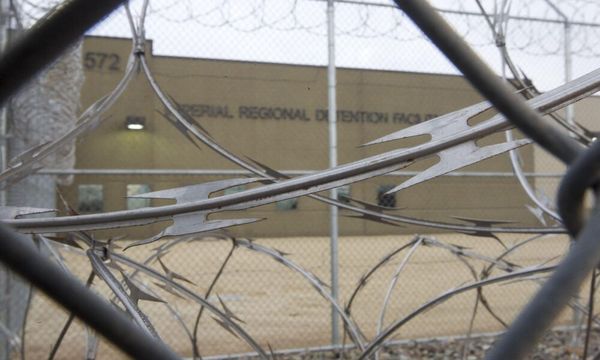
“Um, can I have some help?”
We have come to a rewilding camp on Yuin country, beyond the reach of mobile networks and plumbing. My child and I aspire to be more like the camp leader, Gina Chick, the winner of the SBS reality show Alone Australia. But we have never been camping. My husband’s severe dust and pollen allergies restrict family travel to hotels, so I have borrowed gear from my neighbour. I bought an esky from Big W. I am ready.
Now, how do I put up this tent?
A camp aunty, an experienced camper and mentor for others, calls over a teenage boy who has been coming to this camp since he was seven. He and two of his friends pull out the shelter from its canvas bag and begin discussing the merits of pole tents over pop-ups as they assemble what will be my and Ellie’s home for the next five days.
Ellie joins the kids in bushcraft sessions while the parents gather and chop vegetables, scrub pots and talk. On the first day Gina hands out clay, explaining it is better to chat while doing something with our hands. She shows us how to make a pinch pot. I push my thumb into the ball of clay.
We introduce ourselves and offer our reasons for coming. We coalesce around a common longing: to be more connected with the land, part of a group, to share the load of cooking, cleaning and, most of all, parenting.
I explain that we have never been camping, how my child and I both have social anxiety and the prospect of a week with strangers is more daunting than the pit toilets: “I guess I am a different sort of Asian tiger mum, pushing my kid into the bush.” Everyone laughs.
Gina says: “I want to acknowledge the courage it has taken for you and Ellie to come here this week. That’s a lot.” Everyone makes sounds of concurrence and I sit up a little straighter. “How are you feeling about it now?” she asks.
“I think I am still dissociated,” I reply. More laughs but Gina holds my eye.
“Getting into the river can be good for that,” she says, making a sweeping movement up and down her body.
After lunch, Ellie and I submerge ourselves in the water. I make a range of involuntary noises. The temperature is what others might describe as refreshing, what I would call hypothermic.
That night, after dinner and stories by the fire, and when I have finally found the exact right spot to wedge my hip between the cells of my sleeping mat, I feel a wet kiss on my nose. We don’t own a dog.
Ellie and I scramble out of bed as the rain comes down through the roof.
“Put anything precious under here,” she tells me, making a mound under a raincoat.
“Oh, you mean like books?” I reach for my novel but Ellie shakes her head at me, grabs my medication and plops it into the pile. We get a tarp and shove it between the fly and the tent, stopping the drips getting in on one side, and we cluster ourselves and our things on the other.
“Would you go camping again?” I ask Ellie after we are back in our bags and the rain has lessened.
“If you get a tent that doesn’t leak.”
Gina was right: the icy water of the river (and the rain) was a good way to shock me into my skin. But it is not until the next day that I really feel that I am touching the earth beneath my dirty feet.

While the kids are with their mentors, one of the camp uncles offers the parents a lesson in fire making. We take turns to spin a stick until we make smoke, then an ember. We transfer the ember to carefully constructed nests of bracken, stringy bark and the fluff from bulrushes and tinder fungus, then blow on the ember until it sets the nest alight.
I blow and blow on the ember in my nest but it doesn’t take. I feel a familiar sense of not being able to do the things other people seem to do effortlessly. I am a book person, and a death person, but I am not this person, the type who can make fire and friends.
“Here, let’s add some more bulrush,” the camp uncle suggests. My neighbour offers me the use of his bow drill. Several people cluster around and soon we have another ember. I pass the nest of bracken and stringy bark around so the others can breathe it into being with me.
The golden fragment of sun in my hands grows until the flames break free, flicker upwards and I am carrying fire. The group cheers and I feel a sensation I have never experienced before, a kind of grounded creation of something that came before me. I add my flames to the fire which the tribe keeps going all week long. I ask if anyone else needs a hand.
• Jackie Bailey is the author of The Eulogy, winner of the 2023 NSW premier’s literary multicultural award. When she is not writing, Jackie spends her time helping families to navigate death and dying. She is an ordained interfaith minister with a master’s of theology and is working on a nonfiction book about spirituality in a post-religious world







